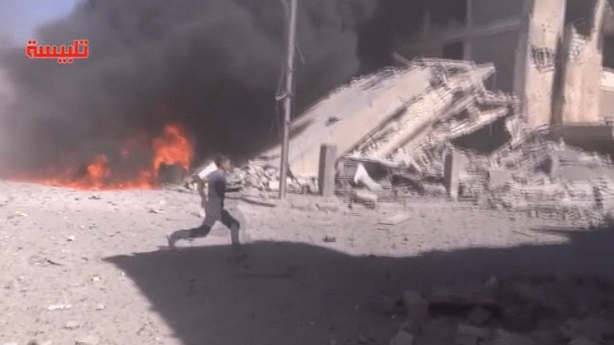The US and Russian militaries could hold talks as early as tomorrow on ensuring that they do not inadvertently come into conflict in their air strikes in Syria, US Secretary of State John Kerry has said.
Russia today launched air strikes in Syria in its biggest Middle East intervention in decades, sending the four-year-old civil war into a volatile new phase.
Moscow's assertion that it had hit so-called Islamic State militants was immediately disputed by the United States and rebels on the ground.
The move also means that Washington and Moscow are running air strikes concurrently and in the same region, but without coordination.
The US State Department said a Russian diplomat in Baghdad notified the US of the intended air strikes an hour in advance and warned that American aircraft that have been pressing a daily bombing campaign against IS positions should avoid Syrian airspace.
Mr Kerry said the Russian warning was ignored and US air strikes continued today.
Mr Putin said he was striking against IS and helping Syrian President Bashar al-Assad, long Russia's closest ally in the region, in this aim.
But Washington is concerned that Moscow is more interested in propping up Mr Assad, who the US has long held should leave office, than in beating IS.
Mr Assad's opponents in the brutal civil war include rebel groups that oppose both him and IS, and that are supported by the US and other Western countries.
The Russian defence ministry said it carried out about 20 flights over Syria, hitting eight IS targets and destroying an IS command post and an operations centre in a mountainous area, Russian agencies reported.
However, Syrians living in rebel-held areas of Homs province said the Russian air force unleashed a whole new level of devastation on their towns.
Jets flying at higher altitudes than the Syrian air force emitted no noise to alert the people below to raids that were reported to have killed at least 33 civilians, including children.

Moscow's intervention means the conflict in Syria has been transformed in a few months from a proxy war, in which outside powers were arming and training mostly Syrians to fight each other, to an international conflict in which the world's main military powers except China are directly involved in fighting.
Russia joined the United States and its Arab allies, Turkey, France, Iran and Israel in direct intervention, with Britain expected to join soon, if it gets parliamentary approval.
US Defense Secretary Ash Carter said of the strikes: "It does appear that they were in areas where there probably were not ISIL [IS] forces, and that is precisely one of the problems with this whole approach."
ISIL is one of the acronyms for Islamic State, which has seized control of large areas of Syria and Iraq over the past year.
Western-backed Syrian opposition chief Khaled Khoja said the Russian strikes had killed 36 civilians and no rebel fighters, and accused Russia of seeking only to keep Mr Assad in power.
At least 200,000 people have been killed and millions driven from their homes since the Syrian civil war began in 2011 when Assad's forces moved to crush peaceful protests against his family's four-decade rule.

